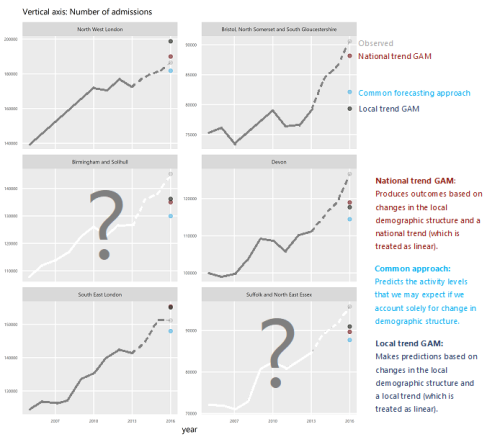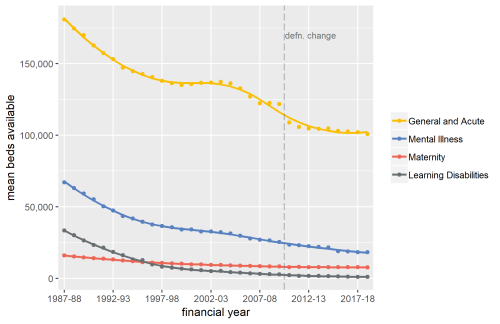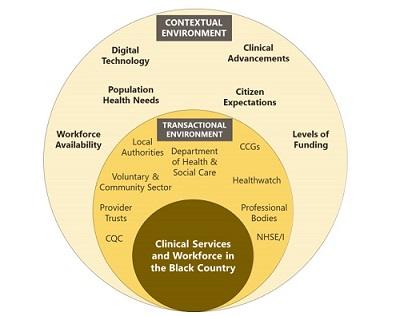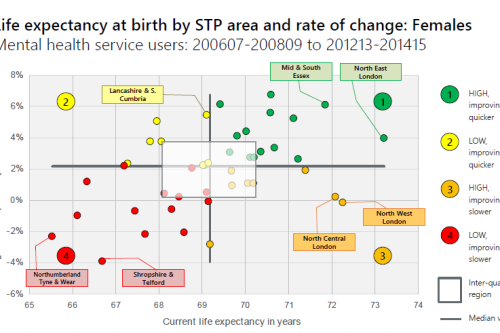 Better use of analysis | Inequalities
Better use of analysis | Inequalities
Population health implications of the Covid-19 pandemic
Our new report for The Midlands Decision Support Network (MDSN) presents findings of the effects of the care disruption, from the Covid-19 pandemic, on population health. The in-depth analysis identifies which patients and health conditions should be the focus of future efforts in reducing…
 Elective care | Inequalities | Policy
Elective care | Inequalities | Policy
What are the ethical challenges in addressing inequities?
Produced by Angie Hobbs - the world’s first Professor in the Public Understanding of Philosophy – this paper examines the ethical questions raised by our report outlining strategies for reducing inequity.
 Inequalities | Policy | Public health and prevention
Inequalities | Policy | Public health and prevention
Measuring the effect of the coronavirus pandemic on population health
Measuring the effect of the coronavirus pandemic on population health One feature of the pandemic has been the fast-flowing stream of facts and numbers about the impact of Covid-19. At the same time, we’ve had to absorb the meaning of terms that were previously the preserve of epidemiologists and…
 Better use of analysis | Elective care | Emergency care | Inequalities | Primary, community and social care services | Public health and prevention
Better use of analysis | Elective care | Emergency care | Inequalities | Primary, community and social care services | Public health and prevention
Less noise and more light: using criteria-driven analysis to tackle inequalities
Reducing health inequality is a long-standing aim of health policy. Yet the gap between policy aim and population outcome has grown in recent years: on most measures health inequalities have got worse.
 Elective care | Inequalities | Policy | Primary, community and social care services
Elective care | Inequalities | Policy | Primary, community and social care services
Socio-economic inequalities in access to planned hospital care: causes and consequences
Tacking inequalities in health is a long-standing NHS policy objective. Variation in the experiences and outcomes of different communities during the COVID-19 pandemic served to bring this issue back into focus.
 Policy
Policy
A framework for understanding policy change
A new policy, strategic direction or major programme is announced. How do we begin to understand, interpret and explain it? And how can we start the task of analysing and critiquing it? I see three main approaches: 1: Personal views As an individual, we might ask whether we like or agree with the…
Strategy Unit analysis of air quality highlights inequalities
Poor air quality is the largest environmental risk to public health in the UK and central London has the highest levels of particulate matter and nitrogen dioxide. The Guy’s and St. Thomas’ charity, now operating its programmes under the Impact on Urban Health banner, have…
 Elective care | Inequalities | Public health and prevention
Elective care | Inequalities | Public health and prevention
Socio-economic and environmental impact of Herefordshire and Worcestershire STP
Anchor institutions are large, typically non-profit, public sector organisations whose long-term sustainability is tied to the wellbeing of the populations they serve. They also have a significant impact on the health and wellbeing of their local communities. Health and care organisations act as…
 Inequalities | Mental health
Inequalities | Mental health
Accessibility of perinatal mental health services for women from Ethnic Minority groups
Barriers to accessing mental health care during pregnancy and the first postnatal year (perinatal period) seem to be greater for ethnic minority women.
 Elective care | Emergency care | Finance and payments | Policy | Primary, community and social care services
Elective care | Emergency care | Finance and payments | Policy | Primary, community and social care services
How will we know if Integrated Care Systems reduce demand for urgent care?
The implications of a blended payment system are far reaching: Decisions about planned activity levels will determine the total funding envelope for urgent care within a system and will influence the behaviour of healthcare providers and the services they deliver to patients.
 Elective care | Mental health
Elective care | Mental health
Exploring Mental Health Inpatient Capacity
This report explores the pressures on inpatient mental health services across Sustainability and Transformation Partnerships in England, drawing on a wide range of datasets, published research and interviews with staff working on mental health services. The report was commissioned by and includes…
 Better use of analysis | Primary, community and social care services
Better use of analysis | Primary, community and social care services
Clinical Workforce Scenarios for the Black Country
The future is highly uncertain. Unless we consider the diverse factors that could affect health, our plans will lack creativity and sustainability. The challenges facing NHS systems are headline news: NHS structures are frequently the subject of organisational change; new policy directives; funding…
 Inequalities | Mental health
Inequalities | Mental health
Making the case for integrating physical and mental health services in England - National overview
This is a national overview report of our Making the case for integrating physical and mental health services reporting which took place in July 2017. The original reports looked at the physical health of people who use mental health services; life expectancy, acute hospital use and…
 End of life
End of life
Changes in Dementia Incidence, Prevalence, Severity and Mortality
Dementia is a key priority for NHS England and is estimated to affect around 676,000 people in the country. Our analysis is intended to help understand the need for future dementia diagnosis and treatment services in a specific area and to help commissioners to identify and…
 Better use of analysis | Elective care
Better use of analysis | Elective care
Scoping the Strategic Analytical Requirements for Clinical Neurosciences in England
Neurosciences encompasses a large number of services and interventions, delivered to individuals with a wide range of conditions by numerous providers in many settings. Describing the full range of patients, interventions and services will provide those who work in and support NHS commissioned…
Commissioning Healthcare Analysis for Complex Problems
This document is a guide to commissioning healthcare analysis for complex problem which has been developed by the Strategy Unit.
Scoping the Future (CRUK)
Within the context of rising demand for diagnostic services and concerns about capacity, Cancer Research UK commissioned this project to explore the issues for endoscopy services, to inform national strategic recommendations.